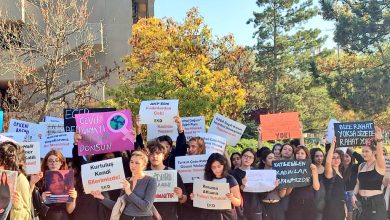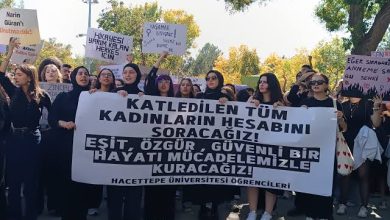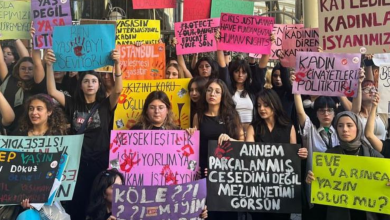We leave school every evening with anxiety due to the inadequate lighting of university campuses in the evenings, and we cannot even feel safe in our schools.
*Ebrar Akdeniz
***
It is challenging for women, children and LGBTI+ individuals to live in safe spaces in the world, especially in Turkey. According to the We Will Stop Femicide Platform, men killed 315 women in 2023 and 248 suspicious femicides. Children are subjected to various tortures. It is becoming increasingly difficult to discuss safe spaces and our remaining hopes daily. The fact that each of the murdered women lost their lives due to violence, harassment and rape by their close circle, the impunity policies we have encountered since then, and the government’s efforts to censor and remove such incidents from the agenda have worn everyone out. As the victims of violence, all areas where we can live have been restricted, and an atmosphere of fear prevails. Walking around the places where we spend our time in our daily lives without worry has become impossible. One of these areas is the university campuses where thousands of young women and LGBTI+ individuals live.
While the time we spend in universities covers most of our daily lives today, it is one of our most natural rights to demand the safety of these areas. We leave school every evening with anxiety due to the inadequate lighting of university campuses in the evenings, and we cannot even feel safe in our schools. The harassment/violence incidents that occur frequently at universities between students or between faculty and students are becoming an agenda that we hear about almost every day. As such incidents increase daily throughout the country, and as new ones are added before we can get over the shocks we experience, we begin to normalise everything even more and position it as a regular part of our lives.
“We have street luminance problems”
We spoke to our friend Emel from Istanbul University about the neglect that university women face on campus. Emel said, “I still have not seen any sufficient security measures taken or creation of safe spaces created for women in Istanbul University” and continued her words as follows:
“While many women study in the library with me in the evenings, we encounter luminance problems such as the lights of Havuzlu Bahçe being turned off and the garden being left pitch dark, the street lights on the school’s vehicle entrance not working in the evenings, and we cannot even walk from school to the metro station five minutes away without worrying. Someone appears in front of the Vezneciler KYK dormitory, which is very close to the school, peeping on the girls in the dormitory, and nothing is done to prevent this. This situation harms the women in the dormitory and the students of Istanbul University. Our school currently has a very complicated campus structure. Other than the main campus, perhaps we cannot even call the remaining parts a campus. And the Beyazıt campus is a region that is very open to any intervention that may come from outside. We, as women, need to be provided with more comfortable spaces that make us feel safe among this scattered and crowded structure. If we cannot feel secure even in our school when two women were brutally murdered very close to our campus, we have to be aware that we need to do something.”
Emel listed the things that need to be done to make Istanbul University a “Safe Campus” as follows:
“If we want to bring the term safe campus into reality, the main goal should be to ensure that each university student can walk freely, comfortably and without worry on or around the campus. The most basic precautions, such as lighting, mustn’t be left out for this purpose. The most important thing is the impunity policies, which are also one of our biggest demands in Turkey. While many sexual predator students and academics roam around the university, our schools must carry out the necessary penal processes and operate a deterrent mechanism for potential perpetrators instead of being their protectors. It is very important for every student that CİTÖK, which supports these processes and takes on a more advanced role for their implementation, is also to be operated effectively and that there is not a single person in Istanbul University who does not know about such mechanisms.”
“Our fight is only possible together”
Some certain groups or school authorities tried to cover the incidents at the university by putting pressure on students and using threats and intimidation. The perpetrators of harassment, rape and violence are not alone; also, the system that turns a blind eye to it and tries to hide it becomes a perpetrator by being an accessory.
With this atmosphere of fear that has been created, university students’ freedom of thought and expression has been hindered for years, and even the tiniest areas where young people come together are tried to be restricted. No matter how much the horrific incidents we experience increase over the years, the oppressive policies of the system usurp the rights of workers, young people, and women to unite and organize, and push us to become members of an even more submissive group. However, we know that women are among those who need an organized struggle the most in this country, and we do not hesitate to unite even for a bit. We struggle to expand women’s unions at our universities further and strive to increase our solidarity networks and make them more tightly knitted. One of the most critical areas where we need to increase the struggle in universities for everyone who is a victim is CİTÖK (Sexual Harassment Prevention Board). Sexual Harassment Prevention Boards, established by students and school clubs in many universities, are the first commission that victims will reach. While university administrations did not create support mechanisms for any women and LGBTI+ individuals, students took the situation into their own hands and united for a purpose.
CİTÖKs were established to act as a bridge between the institutions and the victims to speed up and operate the processes effectively in case of a sexual violence incident in the university. Everyone on campus must be aware of CİTÖK to make our struggle visible. We continue this struggle by developing networks to support and remind each other that we will never be alone on the streets or on campus. From Istanbul University to Boğaziçi, from Yıldız to IAU, we create spaces where women can support each other and come together through Women’s Work Commissions. To continue the solidarity, every woman should join the organized women’s struggle and become a part of it because each struggle grows stitch by stitch from small to large. Today, instead of expecting results from just one action, participating in the activities in the women’s clubs in our universities, getting to know each individual there more closely, being able to talk about our problems and solutions more deeply and continuing the discussions from a later point will create more solid and permanent foundations for the women’s struggle. While our social areas are being taken away from us in universities, we need to make our own areas to grow our solidarity and strive to unite more each day we are isolated. We need to expand our scope every day for safe campuses and an effective CİTÖK that is the protector of this. We will pave the way for many more gains like the CİTÖK that we put into effect with women who contribute to us with every stitch on this path we knit our struggle. Our struggle for safe living spaces and safe campuses is only possible together!



